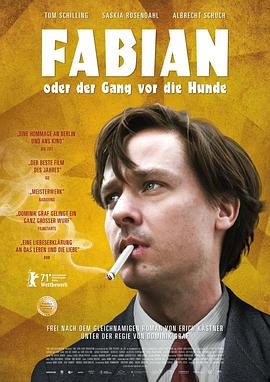Plot:
Berlin, 1931. A milieu somewhere between a rooming house and the underworld, where brothels are artists' studios, Nazis hurl insults in the streets and Babelsberg dreams of making "psychological films". Life is surging, society is fermenting and corroding. As long as he has a job, Jacob Fabian, who holds a doctorate in German studies, writes advertising copy by day and frequents the city's more absurd venues at night with Stephan Labder. While his friend - who later admits that he has failed "in the subjects of life and profession" - is a progressive man when it comes to communism and sex, Fabian remains sober and distant. He waits for the "victory of respectability" without really believing in it. His love for Cornelia is the only thing that makes him question his ironic fatalism. She becomes a ray of hope in his collapsing life. Despite many similarities to today's maligned world, it is a challenge to get Erich Kästner's deeply sad autobiographical novel Fabian - one of the most important novels of the Weimar Republic - out of the gloomy existential environment. Dominic Graf rises to the challenge brilliantly. His style is subtly sharp, cold-bloodedly brisk, yet quietly melancholic. Like a slowly spinning disco ball, the film is about the connection between sexuality and an empty fridge, and the unravelling of dreams of happiness.

